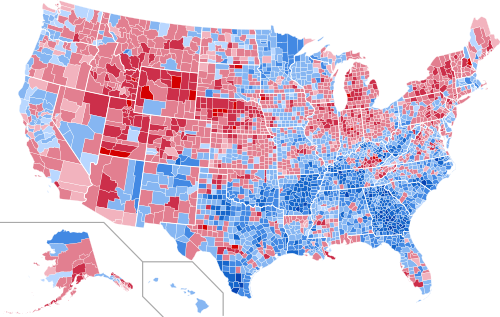1976 United States presidential election
The 1976 United States presidential election was the 48th quadrennial presidential election, held on Tuesday, November 2, 1976. Democrat Jimmy Carter, former Governor of Georgia, defeated incumbent Republican president Gerald Ford in a narrow victory. This was the first presidential election since 1932 in which the incumbent was defeated, as well as the only Democratic victory of the six presidential elections between 1968 and 1988.
538 members of the Electoral College
270 electoral votes needed to win
Ford ascended to the presidency when Richard Nixon resigned in 1974 in the wake of the Watergate scandal, which badly damaged the Republican Party and its electoral prospects. Ford promised to continue Nixon's political agenda and govern as a moderate Republican, causing considerable backlash from the conservative wing of his party. This spurred former California governor Ronald Reagan to mount a significant challenge against him in the Republican primaries, in which Ford narrowly prevailed. Carter was unknown outside of his home state of Georgia at the start of the Democratic primaries, but he emerged as the front-runner after his victories in the first set of primaries. Campaigning as a political moderate within his own party and as a Washington outsider, Carter defeated numerous opponents to clinch the Democratic nomination.
Ford pursued a "Rose Garden strategy" in which he sought to portray himself as an experienced leader focused on fulfilling his role as chief executive.[2] On the other hand, Carter emphasized his status as a reformer who was "untainted" by Washington.[3] Saddled with a poor economy, the fall of South Vietnam, and the political fallout from the Watergate Scandal, including his unpopular pardon of Richard Nixon, Ford trailed by a wide margin in polls taken after Carter's formal nomination in July 1976. Ford's polling rebounded after a strong performance in the first presidential debate, and the race was close on election day.
Carter won a majority of the popular and electoral votes. He was able to carry several Midwestern and Northeastern swing states, as well as most states in the Democratic-dominated region of the South. Ford dominated the Western states. Carter's victory at the polls was due in part to the backlash against the Watergate scandal that still was deeply hurting Republican candidates. Ford became the only vice-president to become president and subsequently fail to win election for a term in his own right.
As of 2020, this is also the last election in which the Democratic candidate won the majority of states in the South, carrying the states of Alabama, Mississippi, South Carolina, and Texas (mainly due to Carter's southern roots), and the most recent election in which the losing candidate carried more states than the winning candidate.
Since the death of George McGovern in 2012, this is the earliest election where at least one of the major party nominees for president (Carter) or vice president is still alive. Ford died in 2006 and both Mondale and Dole died in 2021.
This is the only election in which all 4 major presidential and vice presidential candidates would be their party's nominee for president and lose. In addition to Ford losing this election, Carter would lose reelection to Reagan in 1980, Mondale would lose to President Reagan in 1984, and Dole would lose to President Bill Clinton in 1996.

